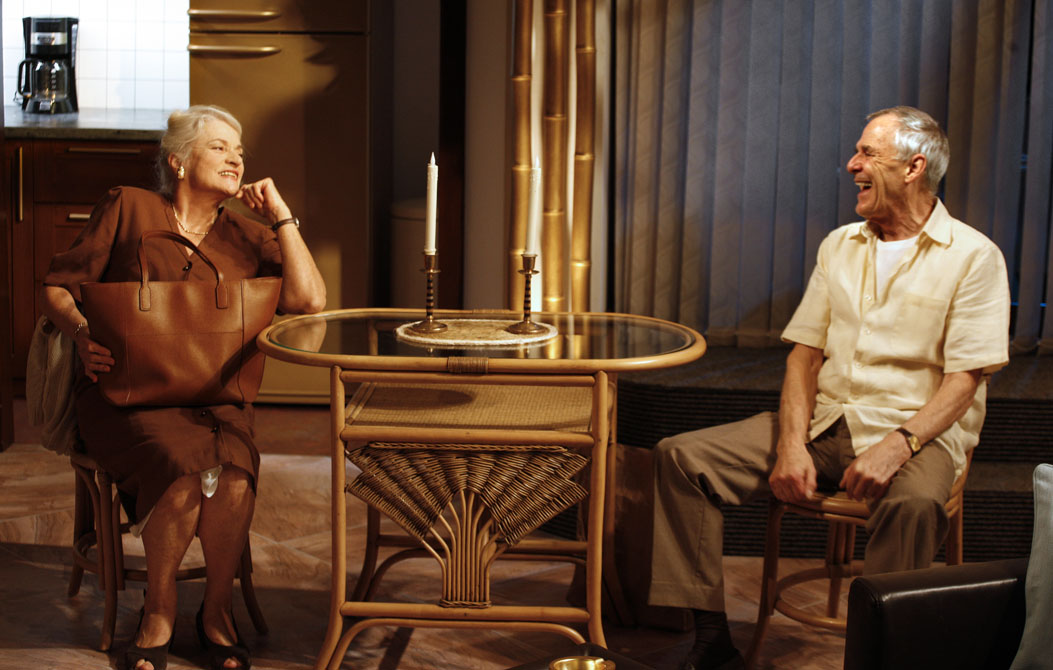 If there’s one thing we can safely say about Laurence Boswell, looking back over his remarkable tenure at the Ustinov, it’s that he knows how to pick ‘em. His eye for the transatlantic transfer and for that matter trans-European translation has in the main been unerring.
If there’s one thing we can safely say about Laurence Boswell, looking back over his remarkable tenure at the Ustinov, it’s that he knows how to pick ‘em. His eye for the transatlantic transfer and for that matter trans-European translation has in the main been unerring.
Of course that is only half the story; his ability to guide / manipulate / cajole (I’ve no idea how he works) the outstanding talent he has managed to attract into giving us superb performances is evidenced by the glowing reviews which fall like confetti on this gem of a theatre. Chief amongst his virtues as a director is the ability to make tangible the relationships of people who are, psychologically, on the edge or veering away from a healthy centre. The present offering by the award winning American writer, Donald Margulies, bears similar fruit.
The model apartment of the title is a metaphor for something outwardly perfect, serviceable, whilst concealing a different, uncomfortable truth. Max (Ian Gelder) and Lola (Diana Quick) have come to Florida for a short break from New York. The ‘luxury’ apartment they have rented, with its top of the line equipment is, however, not what it seems, indeed is something of a sham. Max and Lola are Jews, survivors. Lola, like The Ancient Mariner, is burdened with a story she has to tell to everyone she meets. Their daughter, Debby (Emily Bruni) has followed them, uninvited, to Florida
The story Lola tells is not one of horror, but curiously and chillingly an almost charming anecdote of her time in the prison camp. The horror has been displaced, finding its outlet in Debby, a morbidly obese woman whose mental health is fractured by her own compulsion, which, disturbingly, is related to an inherited experience of the holocaust, in particular at the hands of Joseph Mengele. Compulsive eating is for her a coping mechanism, she eats not for herself alone, but for all the Nazis who teem in her brain as part of the inheritance of her parents. For Max she is, sadly, a lost cause and he frequently dreams of the young, healthy girl she once was.
Tumbling into their lives (somewhat implausibly) is Debby’s boyfriend, Neil (Enyi Okoronkwo) who by pure coincidence tries to burgle the apartment. Neil, for totally different reasons, is also a damaged individual.
Mr Boswell draws out the connective tissue of this unsustainable mix exposing the neurotic excoriations with clarity and care. The cast, each faultless in showing their character’s struggle to keep the past at bay do so with impeccable American or German-Jewish accents. Diana Quick wrong foots us into a sense of normality; her character’s experience has led her to a choice of ‘nothing matters’ or ‘everything matters’. She has taken the latter and is picky. The apartment irritates and yet she does not share the outrage of her husband over the clear fraud. Somewhere in her makeup there is an accepting shrug. Her daughter on the other hand has found no accommodation for the past, which gnaws away. The wound will not heal, the scab is constantly picked at.
The play is a corrective to the idea that the psychological trauma of the holocaust will fade with the demise of the survivors. Mr Margulies’ play reminds us that it is a stain on humanity that will (to quote the play currently in the main house) ‘The multitudinous seas incarnadine’ for generations yet.
★★★★★ Graham Wyles 29th November 2018

